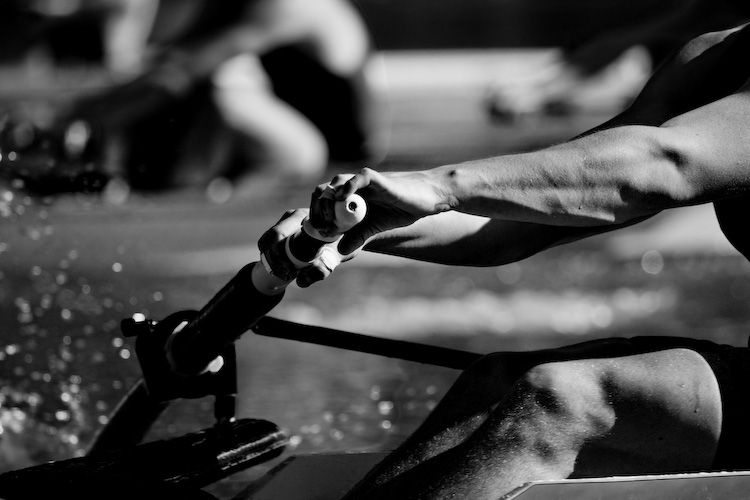Row, Row, Row Your Boat

Early in the morning, I inch my way toward the police barricades on Kelly Drive in Philadelphia, PA, a Mecca of the rowing world, where scullers and sweepers pay their respects each Sunday. In Harry Potter, Platform 9 3/4 grants one entrance into the wizarding world; I gain admission with my parking pass. Through the barricade, the audible command "Weigh 'nough!" lets me know I have returned to crew country.
Crossing the physical threshold, I simultaneously experience a metaphysical transformation. Memories of past races flash before my excited brain as my heart pounds with anticipation for that day's events. Like gypsy caravans, rowers, coaches, boats, and spectators flood the riverbanks, arriving by bus, car, and trailer to stake their claims along the 2000-meter racecourse. On my side of the barricade, crew teams and their fans erect their tents, trailers, and stalls like miniature sovereign city-states along the unassuming banks of the Schuykill River. Throughout the day, river nomads sell their wares, officials facilitate dock and race traffic, weekend gourmets and hash-slingers alike feed the hungry hoards of athletes, and passionate fans scream, pray, and coax their rowers down the course. Coaches - ever with stopwatch in hand - race parallel to the course on their bikes. And others row.
Rowers vividly experience this world. Non-rowers acknowledge its existence. In many ways the crew community is its own world, with citizens, unique styles of dress, and jargon. Where else is one under the command of a small, loud person in spandex and the Napoleon-complex to match his or her stature? I entered this microcosm in my freshman year, a neophyte unable to distinguish port from starboard and completely unaware of the extent to which crew would sculpt my body, exercise my mind, expand my imagination, and teach me new depths of kindness, justice, and discipline and new heights of success.
If one has never rowed, the difficulty of the sport is impossible to understand. From the position of a spectator, rowing could appear to be a very serene and relaxing sport; the slender boats seem to glide effortlessly on the glassy surface of a picturesque lake. The reality is very different. Rowing is one of the few sports which employ all of the body's muscle groups. The core muscles must work constantly to keep one stable in the 60-foot boat whose rounded hull makes it unstable by nature. If not for the oars, the entire boat would instantly capsize. The balance of the boat, called the "set," depends on the very exact synchronization of the movements of eight independent rowers. The heights at which they hold their hands and the exact angles of their arms, torso, and legs greatly affect the boat. Minute changes, such as adding a 1/6 inch washer to the oarlock of a rigger, can make a huge difference. Any rower a fraction of a second too early or too late or holding the oar too high or too low could "catch a crab," the rower's blade violently and steadfastly caught in the water. In a boat at full speed, catching crab can bring the boat to a stop as it veers off course, cause the boat to go from first to last place, and even result in a rower's ejection from the boat and serious injury.
The high-risk nature of crew dictates that athletes participating in this sport perfect it as nearly as possible. However, in addition to preventing many accidents, practicing the sport with diligence, six days a week, does something much greater. Extracurricular is a word that applies to all activities outside the realm of academics, such as athletics. However, crew has been not simply a diverting aside to my high school education, but also an integral element of it. Crew is a large commitment of time and of self. I row for one of the preeminent women's high school teams in the nation from August to June. Crew means spending about sixteen hours per week at the boathouse, dedicating my full self to every second and every stroke of that time. To excel in crew requires an incredible input of time, effort, energy, and emotion, but the return is equally great. As school has honed my mind and intellect, crew has helped me to gain physical and mental courage, stamina, commitment, and the will to excel. Some lessons, learned only through sports, are essential for the development of the whole person.
Like most of life, part of any success is luck. I am fortunate to live outside a major rowing city. I am also fortunate to attend a high school whose crew program has earned national repute - in spite of its relative youth and small pool of student athletes. Our masterful coaches have led many competitive and hardworking athletes to win national championships. As freshmen, we earn our place on this incredible team by persevering from September to June, battling weather, wakes, and blisters. I emerged in May of my freshman year an undefeated champion. Though my hands were calloused, my mind was never more acutely aware of my own body, my ability, and the heights I could reach with my boat mates. Mount Crew had taught me to reach down inside myself and tap the stamina; courage; perseverance; dedication; commitment; selflessness; and most important, the drive to compete and achieve in all areas of my life.
Each year I row, I build on this foundation. As a practical matter, experienced rowers must fine-tune technique and push their bodies beyond preconceived physical limits. Varsity rowers are always subject to repositioning by coaches within and among the boats of the team's fleet (although I have been fortunate to row in the varsity lightweight eight since fall of my sophomore year). Seats are lost and won through erg tests, seat races, and performance in competition. Through this ever-changing landscape, forming ties quickly and acquiring the synchronization necessary for success are difficult. Knowing that I am challenged by my coaches and teammates to perform on a higher level every day, I have developed focus and confidence by dedicating myself to earn my seat each practice.
Citizenship in the nation of rowers comes at a price: self-sacrifice. In order to succeed in rowing, one sacrifices his or her autonomy to follow the rower in front of her for the greater good. Individual will is sacrificed to complete trust. Boat mates form incredible bonds through the deep and reflexive confidence they place in one another as they face challenges together, through "blood, sweat, and tears." Though dramatic, the "Peace by Inches" speech made by Al Pacino's character in Any Given Sunday captures the essence of our sport:
You find out life's this game of inches... The margin for error is so small--I mean one-half a step too late, or too early, and you don't quite make it. One-half second too slow, too fast, you don't quite catch it. The inches we need are everywhere around us. They're in every break of the game, every minute, every second.
On this team, we fight for that inch. On this team, we tear ourselves and everyone else around us to pieces for that inch. We claw with our fingernails for that inch, because we know when we add up all those inches that's gonna make the ******' difference between winning and losing! Between livin' and dyin'!
I'll tell you this: In any fight, it's the guy who's willing to die who's gonna win that inch. And I know if I'm gonna have any life anymore, it's because I'm still willin' to fight and die for that inch. Because that's what livin' is! The six inches in front of your face! ...You got to look at the guy next to you. Look into his eyes! Now I think you're gonna see a guy who will go that inch with you. You're gonna see a guy who will sacrifice himself for this team because he knows, when it comes down to it, you're gonna do the same for him! That's a team, gentleman. And, either we heal, now, as a team, or we will die as individuals.
This speech is so poignant that the Canadian National Team has matched it to a YouTube video called "Inches," used to inspire crews around the globe. In my sophomore year, our coxswain read the speech before each race. I came to learn how important these inches are through both failures and successes. My boat has missed first place at Scholastic Nationals by .02 seconds and earned a place in the finals at US Rowing Nationals by 6 centimeters.
In this highly competitive rowing community, where months of training culminate in races which last five minutes and the difference between a championship finish and last place can be fractions of a second, I have unexpectedly become part of the system of social justice that evolves within rowing programs and even among teams. The older rowers mentor up-and-coming teammates - even though these same girls will be vying for the upperclassmen's seats the next year or even the next week. Girls coach one another through grueling 2ks to help them row harder and faster. This incredibly strong sense of selflessness and wanting the team to be the best it can inspires teammates to push one another to reach personal bests.
The most poignant experience, however, came from my relatively brief interaction with a team that hails from 3000 miles away, clear across the United States. The respect and compassion of a championship lightweight eight from San Diego best captures the true spirit of crew. Last year at US Rowing Youth Nationals in Cincinnati, Ohio, the premier youth rowing competition in the country, one of my boat mates became ill at the starting line of the semi-final heat. The start is a particularly stressful time. All the energy needed for the explosive start which propels the 60-foot boat from a standstill to full speed is at the ready, blades squared in the water. After a fast-paced exchange with the officials, we replaced our sick teammate with a spare who had never practiced in our boat. As we approached the finish, in fifth place with 300 meters left in the race, we miraculously "found more" and pulled from within ourselves to cross the finish line in third place by centimeters, earning a slot in the final to be held the next day. As we later carried our boat from the river to our trailer, the reigning lightweight eight champions, Los Gatos from California, approached us. These phenomenal athletes first inquired about our teammate. Then, they immediately told us that they had been so impressed with our come-back from behind to scrape out the third-place finish required to make the final race that they wanted to exchange "unis" (spandex one-piece racing uniforms) with our boat after the final race. Trading T-shirts among rowers is common, but offering a uni is the ultimate sign of respect. Their act of humility and respect will stay with me always, and I remember them most especially each time I wear my Los Gatos uni to practice.
The crew world is unique in many ways, but most especially through the lessons which rowers teach one another in this atmosphere of intense competition and the respect and esteem with and in which rowers hold one another because they know that they are "in the same boat," experiencing similar challenges and sharing experiences with the acute agony of defeat as well as the incredible rush of victory. Championship is not merely winning or losing; it is also "how you play the game." With school and with life, like in rowing, the road one must take to achieve is equally, if not more important than the final result. Sometimes misinterpreted as exclusivity by the uninitiated, the bonds among athletes are the product of hard work and a common experience. As John F. Kennedy once said, "We go to the moon, not because it is easy, but because it is hard." Rowers immerse themselves in this sport for the same reason. Man's first steps on the moon, that "one small step," instantaneously validated government spending of millions of dollars and the entire NASA program. For me, five minutes of pure exhilaration, adrenaline, determination, and endorphins validate all that I put into my sport: uncounted hours spent at the river, hundreds of miles rowed each season, six days of practice a week, years of training, my experience, my mind, my emotions, my body, and the countless instances of joy and pain, triumph and defeat, which I have faced with my teammates.
If you enjoy and rely on row2k, we need your help to be able to keep doing all this. Though row2k sometimes looks like a big, outside-funded operation, it mainly runs on enthusiasm and grit. Help us keep it coming, thank you! Learn more.
Comments | Log in to comment |
There are no Comments yet
| |
- Bont Rowing
- Calm Waters Rowing
- Concept 2
- Craftsbury Sculling
- The Crew Classic
- CrewLAB
- Croker
- Durham Boat Co.
- Empacher
- Faster Masters
- Filippi
- Fluidesign
- h2row.net
- HUDSON
- Live2Row Studios
- Nielsen-Kellerman
- Oak Ridge RA
- Peinert Boat Works
- Pocock Racing Shells
- Race1 USA
- RowKraft
- Rubini Jewelers
- Vespoli USA
- WinTech Racing
- Bont Rowing
- Calm Waters Rowing
- Concept 2
- Craftsbury Sculling
- The Crew Classic
- CrewLAB
- Croker
- Durham Boat Co.
- Empacher
- Faster Masters
- Filippi
- Fluidesign
- h2row.net
- HUDSON
- Live2Row Studios
- Nielsen-Kellerman
- Oak Ridge RA
- Peinert Boat Works
- Pocock Racing Shells
- Race1 USA
- RowKraft
- Rubini Jewelers
- Vespoli USA
- WinTech Racing

















